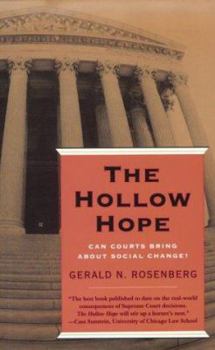The Hollow Hope: Can Courts Bring about Social Change?
(Part of the American Politics and Political Economy Series Series)
Select Format
Select Condition 
Book Overview
Liberals have acclaimed, and conservatives decried, reliance on courts as tools for changes. But while debate rages over whether the courts should be playing such a legislative role, Gerald N. Rosenberg poses a far more fundamental question--can courts produce political and social reform? Rosenberg presents, with remarkable skill, an overwhelming case that efforts to use the courts to generate significant reforms in civil rights,...
Format:Paperback
Language:English
ISBN:0226727033
ISBN13:9780226727035
Release Date:May 1993
Publisher:University of Chicago Press
Length:432 Pages
Weight:1.35 lbs.
Dimensions:1.1" x 6.0" x 9.0"
Customer Reviews
3 ratings
Indispensable examination of the efficacy of courts as agents of social change.
Published by Thriftbooks.com User , 18 years ago
Lawyers and politicians see courts as a means of creating, or forcing, social change. Lawyers have a professional commitment to this vision because without powerful courts, their work becomes less important; politicians adhere to this view because of the rhetorical force of rants against the evil and (usually) liberal courts. Rosenberg describes this as the dynamic view of courts. In contrast, the constrained court model posits a court that requires certain internal and external conditions before it can act, and that these constraints limit the courts to only a supporting role to change primarily pushed through the political processes. Rosenberg engages in an empirical analysis of the Supreme Court's effect upon social change in primarily two areas: desegregation and abortion. These are ambitious and controversial challenges because it is accepted legal gospel that both Brown and Roe created massive social change. Contrary to this wisdom, Rosenberg argues that neither case directly or indirectly created social change. For instance, desegregation rates remained nearly unchanged for more than 10 years after Brown; it was not until Congress passed the Civil Rights Act and educational funding bills that conditioned federal aid on ending segregation that desegregation became a reality. Rosenberg engages in a similar analysis for abortion and Roe. While the evidence as to the limits of direct social change is compelling, Rosenberg's analysis of indirect effects is obviously weaker and somewhat more speculative because of the difficulty of demonstrating causation for indirect effects, though he does argue that there is little reason to believe court decisions indirectly effect change through encouraging popular movements. Overall, the Court's work for the 15 years following this book seems to support its conclusion: the Court refused to declare a right to die where the country is deeply divided over the issue; it has loosened constitutional protection for abortion, which is in line with the majority of Americans who support abortion with some limits; it has only shown limited interest in gay rights, striking down sodomy laws that 70%+ of Americans opposed, while avoiding gay marriage which roughly 70% oppose. While not without controversy, Rosenberg's book is a central and indispensable work of political science. There is vigorous debate over elements of this book, particularly regarding his conclusions on indirect effects, which is all for the best because scholars who once assumed the efficacy of courts are now on notice that they most prove their assumptions are empirically valid. Students of public law and the Court will find much of value in Rosenberg's seminal book.
Best Book EVER!
Published by Thriftbooks.com User , 22 years ago
Rosenberg kicks ... "GR" has written a thought-provoking, insightful, saucy account of the academy's hero worship of the Supreme Court. Not unlike McCloskey, Rosenberg refuses to divorce the Court from its socio-political location and in the process challenges reductive analyses from the likes of David O'Brien. Rock on, GR.
The weakest branch
Published by Thriftbooks.com User , 27 years ago
In The Hollow Hope, University of Chicago political science and law professor Gerald Rosenberg defends a thesis that, although its roots in American thought extend back to Alexander Hamilton, is currently a highly controversial one. He argues that court decisions, in spite of the importance ascribed by political analysts of all stripes to such landmark cases as Brown v. Board and Roe v. Wade, are generally incapable of generating significant social reform. Using a combination of quantatitive data and textual analysis, he argues (persuasively) that the Brown decision had little impact on school segregation. Significant headway, Rosenberg argues, was not made against this vexing social problem until the enactment of the 1964 Civil Rights Act. With respect to Roe v. Wade, he argues that the decision had an ultimately counterproductive effect by energizing the pro-life movement and setting back a trend towards the liberalization of abortion laws that was well under way before 1971. A social scientist, Rosenberg is careful to maintain a degree of equivocation with respect to the issue. He posits a framework under which court decisions might mave a greater than typical impact. And indeed, his evidence cannot be regarded as defintive proof- it is impossible to quantify all of the possible effects of a key court decision. He argues very compellingly, however, that the faith placed by liberals in the courts is based more on emotion than evidence, and this might have the consquence of wasting precious resources on expensive legal victories that do not manifest themselves within the American polity. As such, this lucid and challenging book is essential reading for anyone who is interested in American public law




